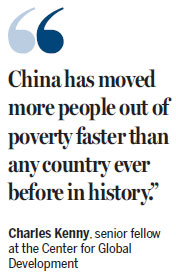China helped cut world poverty rate: UN
The number of people living in extreme poverty has plummeted since the UN's millennial goals report began 15 years ago, with China's progress in poverty alleviation contributing largely to that achievement.
The latest United Nations Millennium Development Goals (MDGs) Report, however, showed mixed progress on the eight "ambitious" goals for global development.
The report, released Monday, summarizes 15 years of global efforts to "free the entire human race from want", as written in the Millennium Declaration in 2000.
Measured though 21 targets and 60 official indicators, the MDGs attempted to narrow the focus of global development to eight salient issues: poverty, education, gender equality, child mortality, maternal mortality, HIV infections, water access and development aid.
While the report acknowledges that inequality and bottlenecks in development largely loom over many parts of the world, the achievements in lifting people out of extreme poverty stood out as remarkable.
"The MDGs helped to lift more than 1 billion people out of extreme poverty, to make inroads against hunger, to enable more girls to attend school than ever before and to protect our planet," wrote Ban Ki-moon, UN Secretary-General, in the foreword of the 2015 report.
Charles Kenny, senior fellow at the Center for Global Development and former World Bank economist, said that the main contribution of the MDGs was that they helped to focus development discussions around some key issues and gave a renewed purpose to aid.
"That probably helped reverse the shift towards the decline in aid in the 1990s as well as moving more money into social sectors," Kenny said. "That may have helped spur marginally faster improvements in areas like child health and education.
"But 'marginally faster' at the global level can mean millions of people living better lives and hundreds of thousands fewer dying - that's a big accomplishment."
The UN goal to halve the number of people living in extreme poverty was achieved ahead of deadline, in 2010.
The report shows that the proportion of people living on less than $1.25 a day fell from almost half in 1990 to 14 percent this year.
The actual number of that population fell from 1.9 billion in 1990 to 836 million in 2015, and most progress, according to the report, occurred since 2000.
The astounding progress of poverty alleviation in China contributed greatly to achieving the MDGs regarding poverty. Sixty-one percent of the population of China, the world's most populous country, was living in extreme poverty in 1990, and as that number fell to 4 percent this year, the total number of global poor plunged as well.
"China has moved more people out of poverty faster than any country ever before in history," said Kenny.
He said that is partly because of China's size, but that 30 years of historically unprecedented economic growth also played a crucial role.
While the progress of China's poverty alleviation during the first decade of the 21st century was significant, many worry the progress has reached a bottleneck.

The Chinese government invested around $3.6 billion in poverty alleviation in 2010, increasing to $7.1 billion in 2014.
But the number of people lifted out of poverty in 2014 was around one-quarter that in 2011.
A blue book launched by the Chinese Academy of Social Sciences in April pointed out that the key to breaking the vicious circle of "poverty - population growth - environmental degradation" is to change the unsustainable growth model, optimize the allocation of production factors and spatial factors, improve public service efficiency and truly empower the poor.
Kenny believes that urbanization has contributed largely to the economic growth and poverty alleviation of China during the past three decades, and "getting rid of all remaining controls on the internal movement of people could help that process continue".
"Equitable growth is at the heart of poverty relief," Kenny said.
Kenny also suggested that China learn from the mistakes of the US. "Regulating in favor of monopolies, regulating against high-density housing, unnecessarily regulating trade, and coddling industries like finance and defense lead to slower growth and greater inequality," he said.
"Ensuring universal access to quality health and education alongside a progressive tax and transfer system fosters growth with equality."
Liu Jingyang in Washington contributed to this story.
























